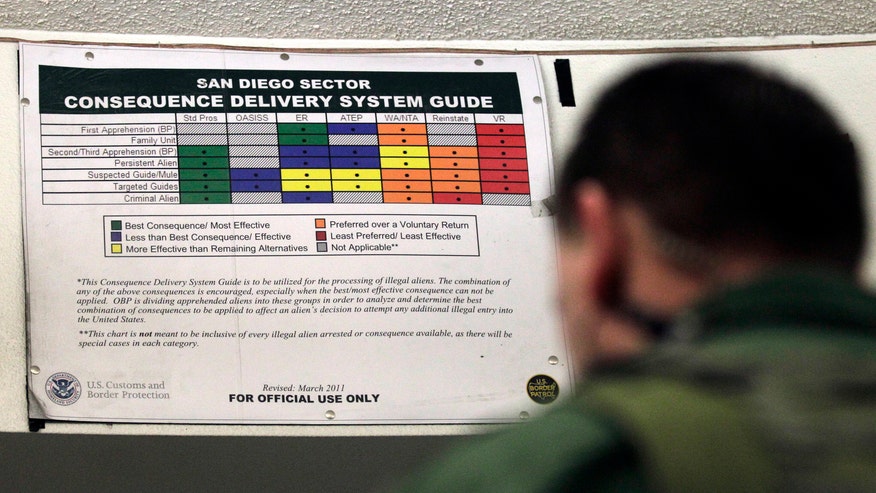“Your mind is sharp,” a pitch on CBP.gov reads. “Your body is tough. Your soul is driven. You’re built for the border.”
Qualified candidates can earn between $39,012 to $63,894 for preventing terrorists and their weapons from entering the country, as well as to apprehend those found in violation of immigration laws some critics say aren’t being properly enforced.
Applicants must be under age 37 (barring certain exemptions) and be fluent in Spanish, or be able to learn the language during an additional 40-day training period. Other requirements include a valid state driver’s license, a fitness test and medical review, a thorough background check and a drug test. Candidates may also be subject to a polygraph examination.
“A third step would be to actually allow us to enforce the laws we were hired to do and there doesn’t seem to be the political will to do that.”
– Shawn Moran, vice president, National Border Patrol Counsel
New hires would then be asked to complete a 58-day paid basic academy training at the Border Patrol Academy in Artesia, N.M.
“Training includes such topics as immigration and nationality laws, physical training and marksmanship,” the listing continues. “Border Patrol agents must be willing to work overtime and shift work under arduous conditions, be proficient in the use of and carry firearms.”
While interest to join the other 20,863 current border patrol agents is expected to be high, the hires won’t likely translate to a safer, more secure border, particularly in the Southwest, according to immigration experts and the National Border Patrol Counsel.
“I don’t think you’re going to see a significant impact,” NBPC vice president Shawn Moran told FoxNews.com. “If this is just an attrition class, with a few hundred or even a few thousand new agents, we’ll just get back to the 21,370 [agents] we’re authorized for. I don’t expect to see Earth-shattering changes in terms of our effectiveness.”
Moran, whose agency represents roughly 17,000 Border Patrol agents, said he expects to see fierce competition among those candidates regardless of how effective they’ll inevitably be in the fight against illegal immigration. Having between 300 and 400 qualified candidates per vacant job was not unheard of during the 1990s, he said.
“Our position has been that we need better training and we need full manpower,” Moran said. “So this is a step in that direction, but they will still be subject to the same budgetary cuts. A third step would be to actually allow us to enforce the laws we were hired to do and there doesn’t seem to be the political will to do that.”
Alex Nowrasteh, an immigration policy analyst at the Cato Institute, a Washington-based think tank, said he predicts no shortage of applicants — but the quality of those job seekers may be an issue.
“[CBP] has increased its size six-fold since 1989 and has doubled since 2004, so they’re pretty good at expanding rapidly and finding applicants to take these jobs,” Nowrasteh told FoxNews.com. “They might have to adjust their standards for hiring and there’s some evidence in recent years that there’s more complaints about border agents and more reviews of potential corruption, so a cost of rapidly expanding could be a lower-quality Border Patrol.”
Nowrasteh said he expects to see little impact along the border with the new hires once in place.
“The flow of illegal immigrants into the United States is more determined by our economic growth rates and job market opportunities for immigrants than it is by security or the number of Border Patrol agents,” he said. “We’re already beyond the point where additional agents will have an impact — they can only do so much to regulate and control this border without allowing more legal immigration.”
The Obama administration, Nowrasteh said, has clearly focused more on border security rather than internal enforcement of the nation’s immigration laws in recent years.
“From 2009 to 2012, the president massively increased interior immigration enforcement,” he said. “But since 2012, interior immigration enforcement decreased and more emphasis has been placed on border enforcement. And this is just a continuation of that strategy.”
Jessica Vaughan, director of policy studies for the Center for Immigration Studies, also questioned whether the hires represent the “best bang for our buck” in terms of overall federal law enforcement precedence.
“The Border Patrol’s sister agency, Immigration and Customs Enforcement, has a shortfall of officers and interior enforcement has declined much more than border enforcement has,” Vaughan said. “It seems, I would argue, the priority should be bolstering interior enforcement because that would help American communities that are struggling with the fiscal and criminal problems resulting from illegal immigration.”
A report released Wednesday by the Center for Immigration Studies revealed that interior enforcement activity in the United States is suffering from declining arrests and deportations, and with tens of thousands of criminal illegals being released back to American communities.
Total deportations credited to Immigration and Customs Enforcement, the majority of which were illegal immigrants arrested by the Border Patrol and CBP officers at the ports of entry, declined 15 percent from 2013 to 2014, according to a review of ICE records by the group.
The report also found that the number of aliens who have received a final order of removal, but remain in the United States, has risen to nearly 900,000. Nearly 160,000 of these are convicted criminals who were released by ICE and are currently at large.


